The debate over English language TV in Wales
- Published
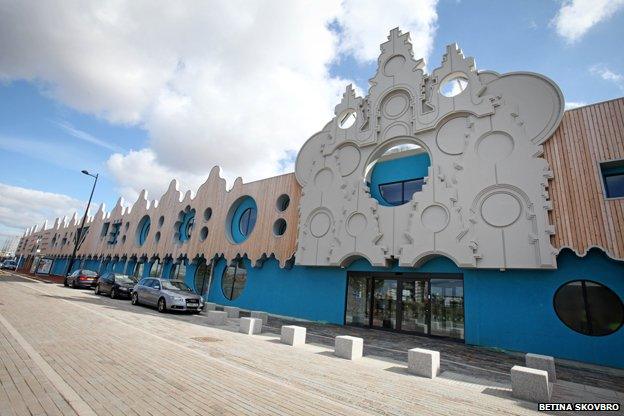
The BBC wants to produce more drama for the English language audience in Wales
In April 2014, the BBC's director general, Tony Hall, gave a speech in which he said English language television from and for Wales had been declining for almost a decade.
He called for a debate about how to address the "erosion" in programming.
So in the year since, how has the industry responded?
There were many thoughtful nods among the invited audience at the Pierhead building in Cardiff Bay as they listened to Lord Hall's speech.
Lord Hall said in April 2014 that broadcasters needed to improve services in Wales in a digital age
His remarks about the health of English language broadcasting in Wales reinforced a view many present had come to accept.
But Lord Hall left little doubt that tight financial settlements had also contributed to the prioritising of news, current affairs and factual programming at BBC Wales over the more expensive options of drama, comedy and entertainment.
While his comments were directed at the broader TV industry in Wales, it was his own organisation which took much of the resulting scrutiny.
Despite an agreeable audience, the strength of his statement surprised many.

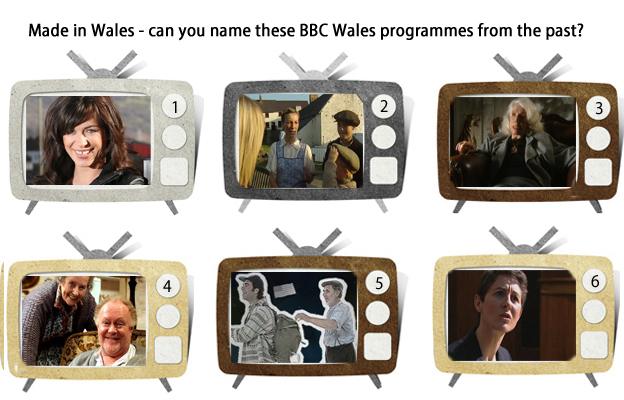
Answers at the bottom of the page

Wales-based network BBC TV dramas such as Doctor Who, Sherlock and Casualty have helped to boost the nation's reputation for programme-making.
But it was specifically programmes made in Wales that reflect Welsh life which Lord Hall felt had been eroded.
The independent television producer Angela Graham listened to the speech.
"Who could fail to be surprised when the director general of the BBC comes to Wales, a relatively rare event, and acknowledges an erosion in English language television over the last decade?
"It's surprising because an institution tends not to volunteer its weaknesses into the public domain.
"So the fact that the director general did focus on a weakness in the BBC's service for Wales was extremely significant. I would call it a game-changer."
Levels of English-language programming have fallen among all of the public service broadcasters. It is a decline that Ms Graham has observed first-hand.
"I take a particular interest in science documentaries, and whenever I ask anybody 'When did you last see a science documentary made in Wales that wasn't about the natural world?'
"I've never found anybody who could think of anything within the last 25 years, and I suspect the last 30 years. And that seems extraordinary.
"We have the Welsh government trying to encourage young people in Wales to take an interest in science, we have world class research happening in Wales, but the Welsh do not see themselves on television being scientists in the English language."
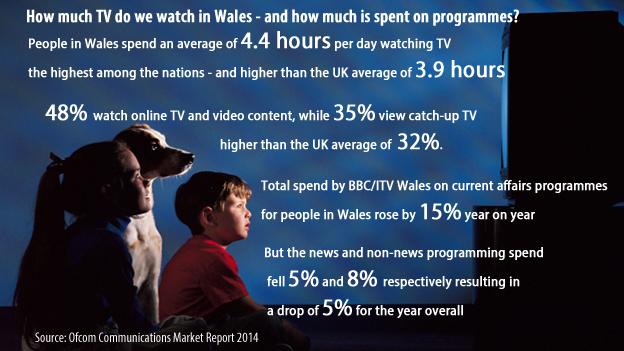
People in Wales watch more TV than the UK average
The director of BBC Wales, Rhodri Talfan Davies, accepts the deficiencies in his TV output.
"I think spending on English language television has fallen by 30 or 35% over the last seven or eight years, so Tony was identifying the consequences of that - which is that as you protect vital services like news, there is less money to go around for other areas of national life that might be captured through drama, comedy or entertainment."
Rhodri Talfan Davies wants to see more home-grown drama and comedy
Following Lord Hall's speech, I was asked by producers within the BBC and the independent sector whether the director general brought his cheque book to Cardiff.
But a continuing shortage of cash appears to be the main explanation for the decline in programming.
"The BBC has faced a 26% funding reduction in real terms over the last four years, there aren't magic pots of cash.
"But I think what Tony was saying was we need to think through how we want Wales to be best served by its public broadcasters over the years to come," said Mr Talfan Davies.
While the BBC has been the focus of much of the discussion since Tony Hall's visit, other public service broadcasters have also made changes, though not necessarily as a result of the director-general's intervention.
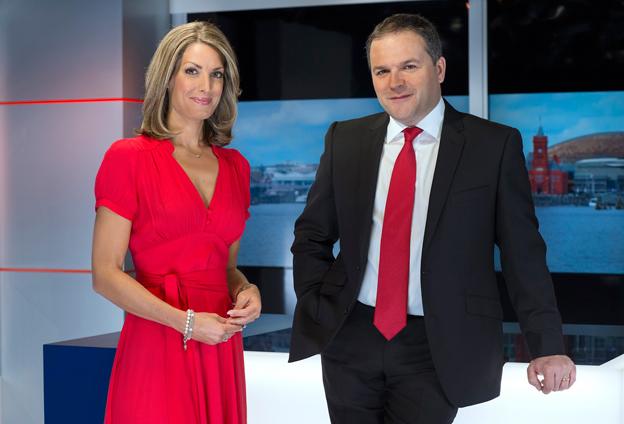
ITV Wales shows four hours of news programmes a week
ITV Wales didn't want to be interviewed on the topic, but every week the channel broadcasts four hours of news programmes, and 90 minutes of non-news programmes for its Welsh audience.
While the quantity of programming is unlikely to increase, commissioners from the ITV network have begun holding regular meetings with the independent sector in the hope that the number of programmes that are made in Wales and shown on ITV across the UK can increase.
But ITV Wales's days of producing home-grown drama and comedy series appear to be consigned to history.
While it has recently broadcast new documentaries like The Mountain and My Grandfather Dylan, other genres of programming remain too costly for the broadcaster's Welsh channel to commission.
Content made in Wales, though not necessarily reflecting Welsh life, is set to increase on Channel 4.

PAST AND PRESENT ITV WALES PROGRAMMES:
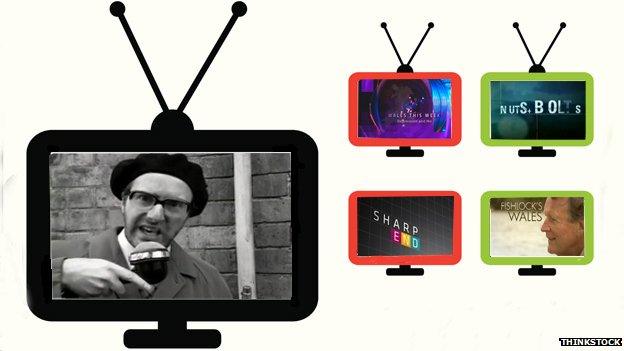
Now and then - some ITV Wales programmes
Wales This Week - long-running investigative series
Sharp End - political discussion and debate with Adrian Masters.
Nuts and Bolts - drama filmed in Merthyr and set in the fictional south Wales town of Ystrad, which ran for four series from 1999-2002.
Barry Welsh Is Coming - comedy sketch show starring John Sparkes which originally ran from 1996-2004.
Fishlock's Wales - one of a number of ITV Wales travel programmes presented by the veteran broadcaster Trevor Fishlock.

Some of the debate over programming for Welsh audiences has taken place publicly over the past year. The Institute of Welsh Affairs (IWA) held a media summit in Cardiff in December,, external where broadcasters and production companies gathered to discuss the issues facing the industry.
The organisation is now conducting a media audit which it hopes will identify the areas of Welsh life that are represented by broadcasters, as well as those that are not.
But another, greater discussion, is about to begin. After the general election in May the process of negotiating the BBC's Royal Charter will begin, with the conclusions set to confirm the 10-year priorities and funding for the BBC from 2017.
While the strength of Lord Hall's language last year took some in the industry by surprise, it was also a warning shot for the opinion formers and politicians sitting among the TV types in the audience.
He will expect them to lobby hard over the coming months, not least because the financial and editorial outcomes of the charter renewal process may help to determine whether the erosion of English language programming in Wales can be reversed.

Answers to the picture quiz:
1 Belonging. Drama starring Torchwood actress Eve Myles and set in the fictional valleys village of Bryncoed. It ran from 2000 to 2008, with a one-off special in 2009.
2 The Coal House. This reality series followed families as they coped with life in the mining cottages of the 1920s and 1940s.
3 The Slate. This was an edition of the arts review programme featuring the late Dorothy Squires. The arts strand also included On Show.
4 High Hopes. Popular comedy series set in the south Wales valleys which ran from 2002 to 2009. It returned for a special one-off in 2015.
5 Satellite City. Comedy series starring Boyd Clack, first broadcast in 1996, and based around an American visitor taken in by a local family.
6 The Bench. A legal drama set in a magistrates' court, broadcast 2001-2002.
- Published1 April 2014
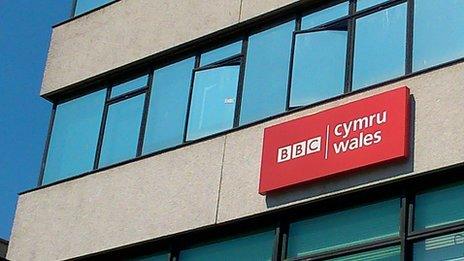
- Published24 June 2014

- Published6 April 2014
